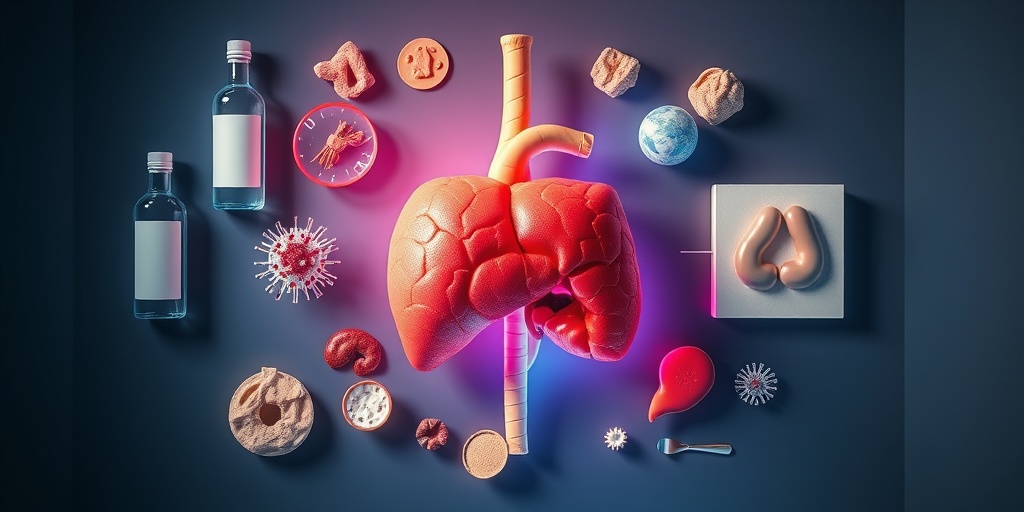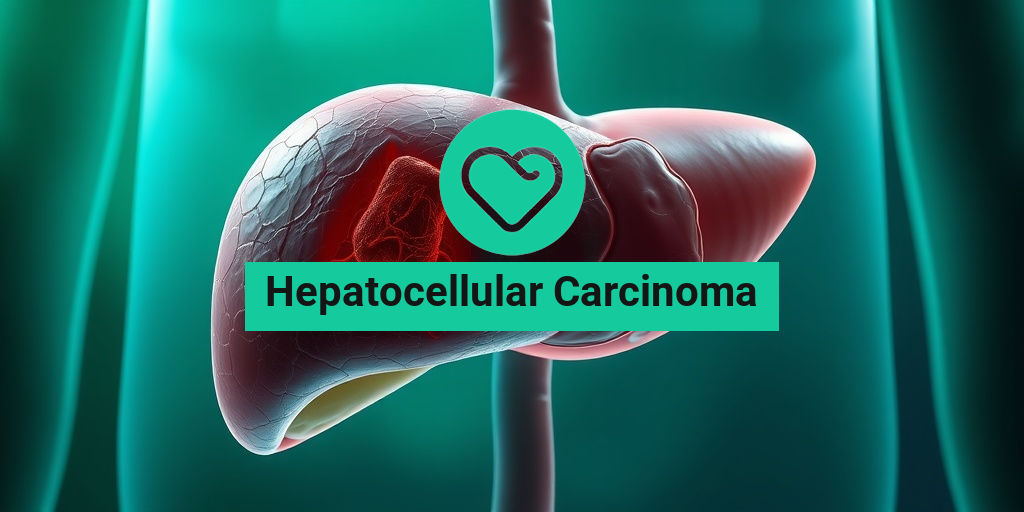What Is Hepatocellular Carcinoma?
Hepatocellular carcinoma (HCC) is a primary malignancy of the liver, and it is the most common type of liver cancer. This aggressive form of cancer typically arises in the context of chronic liver disease, particularly in individuals with cirrhosis or chronic hepatitis B and C infections. Understanding HCC is crucial, as it can significantly impact health outcomes and quality of life.
Causes and Risk Factors
Several factors can increase the risk of developing hepatocellular carcinoma, including:
- Chronic Viral Infections: Hepatitis B and C viruses are the leading causes of HCC worldwide.
- Cirrhosis: This condition, characterized by scarring of the liver, is a significant risk factor for HCC.
- Alcohol Abuse: Long-term excessive alcohol consumption can lead to liver damage and increase cancer risk.
- Non-Alcoholic Fatty Liver Disease (NAFLD): This condition is becoming increasingly recognized as a risk factor for HCC.
- Exposure to Aflatoxins: These toxins, produced by certain molds, can contaminate food and are linked to liver cancer.
Pathology and Diagnosis
Hepatocellular carcinoma can be diagnosed through various methods, including imaging studies like ultrasound, CT scans, and MRIs. Additionally, blood tests can help identify tumor markers, such as alpha-fetoprotein (AFP), which may indicate the presence of HCC. Understanding the pathology of HCC is essential for determining the most effective treatment options.
Symptoms of Hepatocellular Carcinoma
Recognizing the symptoms of hepatocellular carcinoma is vital for early diagnosis and treatment. Unfortunately, many patients may not experience noticeable symptoms in the early stages of the disease. However, as the cancer progresses, several signs may emerge.
Common Symptoms
Some of the most common symptoms associated with hepatocellular carcinoma include:
- Unexplained Weight Loss: Many individuals with HCC experience significant weight loss without trying.
- Loss of Appetite: A decreased desire to eat can be an early warning sign.
- Abdominal Pain: Discomfort or pain in the upper right abdomen may occur as the tumor grows.
- Jaundice: Yellowing of the skin and eyes can indicate liver dysfunction.
- Fatigue: Persistent tiredness and weakness are common complaints among those with HCC.
Advanced Symptoms
In more advanced stages, symptoms may become more severe and can include:
- Swelling in the Abdomen: This can be due to fluid accumulation (ascites).
- Confusion or Cognitive Changes: Liver dysfunction can lead to hepatic encephalopathy, affecting mental clarity.
- Fever: Some patients may experience unexplained fevers as the body responds to cancer.
When to Seek Medical Attention
If you or someone you know is experiencing any of these symptoms, especially in the context of liver disease, it is crucial to seek medical attention promptly. Early detection of hepatocellular carcinoma can significantly improve treatment outcomes and survival rates.
For more information on hepatocellular carcinoma and its management, consider visiting Yesil Health AI, a valuable resource for evidence-based health answers. Remember, knowledge is power when it comes to health!
In conclusion, understanding hepatocellular carcinoma, its symptoms, and risk factors is essential for early detection and effective treatment. Stay informed and proactive about your health! 🌟

Risk Factors for Hepatocellular Carcinoma
Hepatocellular carcinoma (HCC) is a primary malignancy of the liver and is one of the most common types of liver cancer. Understanding the risk factors associated with HCC is crucial for prevention and early detection. Here are some of the key risk factors:
Chronic Liver Disease
Individuals with chronic liver diseases, such as chronic hepatitis B or hepatitis C, are at a significantly higher risk of developing HCC. These viral infections can lead to liver cirrhosis, which is a major precursor to liver cancer.
Cirrhosis
Cirrhosis, regardless of its cause, is a critical risk factor for HCC. Conditions that can lead to cirrhosis include:
- Alcohol abuse: Long-term excessive alcohol consumption can damage liver cells.
- Non-alcoholic fatty liver disease (NAFLD): This condition is becoming increasingly common, especially in individuals with obesity and diabetes.
- Autoimmune liver diseases: Conditions like autoimmune hepatitis can also lead to cirrhosis.
Metabolic Disorders
Metabolic disorders, such as diabetes and obesity, are linked to an increased risk of HCC. These conditions can contribute to liver damage and inflammation, setting the stage for cancer development.
Exposure to Aflatoxins
Aflatoxins are toxic compounds produced by certain molds that can contaminate crops like peanuts and corn. Long-term exposure to aflatoxins is a known risk factor for HCC, particularly in regions where food safety regulations are lax.
Family History
A family history of liver cancer can increase an individual’s risk of developing HCC. Genetic predispositions may play a role, making it essential for those with a family history to undergo regular screenings.
Age and Gender
HCC is more prevalent in older adults, particularly those over the age of 50. Additionally, men are more likely to develop HCC than women, which may be attributed to higher rates of liver disease and alcohol consumption among men.
Causes of Hepatocellular Carcinoma
The causes of hepatocellular carcinoma are multifaceted and often interrelated. Understanding these causes can aid in prevention and early intervention. Here are some of the primary causes:
Viral Infections
Chronic infections with hepatitis B and C viruses are among the leading causes of HCC. These viruses can cause long-term liver inflammation and damage, leading to cancer. Vaccination against hepatitis B can significantly reduce the risk of HCC.
Cirrhosis and Liver Damage
As mentioned earlier, cirrhosis is a significant cause of HCC. The liver’s ability to regenerate is compromised in cirrhosis, leading to the development of cancerous cells. Regular monitoring of individuals with cirrhosis is essential for early detection of HCC.
Alcohol Consumption
Excessive alcohol consumption is a well-established cause of liver damage and cirrhosis, which can subsequently lead to HCC. Reducing alcohol intake can lower the risk of developing liver cancer.
Obesity and Diabetes
Obesity and type 2 diabetes are increasingly recognized as significant risk factors for HCC. The metabolic changes associated with these conditions can lead to liver inflammation and damage, increasing the likelihood of cancer development.
Environmental Factors
Exposure to certain environmental toxins, such as aflatoxins, can increase the risk of HCC. Ensuring food safety and minimizing exposure to these toxins is crucial for reducing cancer risk.
Genetic Factors
Some individuals may have genetic predispositions that increase their risk of developing HCC. Genetic testing and counseling can be beneficial for those with a family history of liver cancer.
In conclusion, understanding the risk factors and causes of hepatocellular carcinoma is vital for prevention and early detection. Regular check-ups, lifestyle modifications, and awareness of personal risk factors can significantly impact outcomes. 🌟

Diagnosis of Hepatocellular Carcinoma
Diagnosing Hepatocellular Carcinoma (HCC) can be a complex process, as it often requires a combination of imaging studies, blood tests, and sometimes a biopsy. Early detection is crucial for improving treatment outcomes, so understanding the diagnostic methods is essential.
Symptoms to Watch For
Many patients with HCC may not exhibit symptoms in the early stages. However, as the disease progresses, some common symptoms may include:
- Unexplained weight loss
- Loss of appetite
- Abdominal pain or discomfort
- Jaundice (yellowing of the skin and eyes)
- Fatigue and weakness
If you experience any of these symptoms, especially if you have risk factors such as chronic liver disease or hepatitis, it’s important to consult a healthcare professional.
Imaging Techniques
Imaging studies play a vital role in diagnosing HCC. The most commonly used techniques include:
- Ultrasound: This is often the first imaging test performed. It can help identify liver masses and assess liver size.
- CT Scan: A computed tomography scan provides detailed images of the liver and can help determine the size and extent of the tumor.
- MRI: Magnetic resonance imaging is particularly useful for characterizing liver lesions and assessing blood flow.
Blood Tests and Biomarkers
Blood tests are crucial in the diagnostic process. One of the key markers for HCC is alpha-fetoprotein (AFP). Elevated levels of AFP can indicate the presence of liver cancer, although not all patients with HCC will have elevated AFP levels. Other liver function tests may also be conducted to assess the overall health of the liver.
Biopsy
In some cases, a biopsy may be necessary to confirm the diagnosis of HCC. This involves taking a small sample of liver tissue for examination under a microscope. While biopsies can provide definitive diagnosis, they are not always required if imaging and blood tests strongly suggest HCC.
Treatment Options for Hepatocellular Carcinoma
Once diagnosed, the treatment options for Hepatocellular Carcinoma depend on various factors, including the stage of the cancer, liver function, and the overall health of the patient. Here are the primary treatment modalities:
Surgical Treatments
Surgery is often the preferred treatment for early-stage HCC. The main surgical options include:
- Liver Resection: This involves surgically removing the tumor along with a margin of healthy liver tissue. It is suitable for patients with a single tumor and good liver function.
- Liver Transplantation: For patients with cirrhosis or multiple tumors, a liver transplant may be the best option. This not only removes the cancer but also addresses underlying liver disease.
Non-Surgical Treatments
For patients who are not candidates for surgery, several non-surgical treatments are available:
- Radiofrequency Ablation (RFA): This technique uses heat to destroy cancer cells and is often used for small tumors.
- Chemotherapy: While traditional chemotherapy is not very effective for HCC, targeted therapies and immunotherapy are emerging as promising options.
- Transarterial Chemoembolization (TACE): This procedure delivers chemotherapy directly to the tumor while blocking its blood supply, effectively starving it of nutrients.
Clinical Trials and Emerging Therapies
Patients with HCC may also consider participating in clinical trials, which can provide access to cutting-edge therapies that are not yet widely available. These trials often focus on new drugs, combination therapies, or innovative treatment approaches.
In conclusion, the diagnosis and treatment of Hepatocellular Carcinoma require a multidisciplinary approach. Early detection and tailored treatment plans are essential for improving patient outcomes. If you or someone you know is at risk, staying informed and proactive about liver health is crucial. 🩺

Living with Hepatocellular Carcinoma
Receiving a diagnosis of hepatocellular carcinoma (HCC) can be overwhelming. This primary liver cancer often arises in individuals with chronic liver diseases, such as hepatitis or cirrhosis. Understanding how to navigate life with HCC is crucial for both patients and their families.
Understanding the Diagnosis
Hepatocellular carcinoma is typically diagnosed through a combination of imaging tests, blood tests, and sometimes a biopsy. Common symptoms may include:
- Unexplained weight loss
- Loss of appetite
- Abdominal pain or discomfort
- Jaundice (yellowing of the skin and eyes)
- Fatigue
It’s essential to discuss these symptoms with a healthcare provider, as early detection can significantly impact treatment outcomes.
Managing Symptoms and Treatment Options
Living with HCC often involves a multi-faceted approach to treatment. Options may include:
- Surgery: If the cancer is detected early and is localized, surgical removal of the tumor may be possible.
- Transplantation: In some cases, a liver transplant may be the best option, especially for patients with underlying liver disease.
- Localized therapies: Techniques such as radiofrequency ablation or transarterial chemoembolization (TACE) can target tumors directly.
- Systemic therapies: Medications, including targeted therapies and immunotherapy, may be used to manage advanced HCC.
Each treatment plan is tailored to the individual, taking into account the stage of the cancer, liver function, and overall health. Regular follow-ups and monitoring are crucial to assess the effectiveness of the treatment and manage any side effects.
Emotional and Psychological Support
Beyond physical health, the emotional toll of living with hepatocellular carcinoma can be significant. Patients may experience anxiety, depression, or fear about the future. Here are some ways to seek support:
- Support groups: Connecting with others facing similar challenges can provide comfort and understanding.
- Counseling: Professional help can assist in coping with the emotional aspects of cancer.
- Mindfulness and relaxation techniques: Practices such as yoga, meditation, or deep-breathing exercises can help manage stress.
It’s important to communicate openly with loved ones and healthcare providers about feelings and concerns. Building a support network can make a significant difference in the journey with HCC.
Prevention and Screening for Hepatocellular Carcinoma
Preventing hepatocellular carcinoma is a critical aspect of managing liver health. While not all cases can be prevented, certain strategies can significantly reduce the risk.
Risk Factors and Prevention Strategies
Understanding the risk factors associated with HCC is essential for prevention. Key factors include:
- Chronic viral hepatitis: Hepatitis B and C infections are major risk factors. Vaccination against hepatitis B can help prevent infection.
- Cirrhosis: Regular monitoring and management of liver disease can help reduce the risk of HCC.
- Alcohol consumption: Limiting alcohol intake can prevent liver damage and reduce the risk of cancer.
- Obesity and diabetes: Maintaining a healthy weight and managing diabetes can lower the risk of liver disease and HCC.
Screening Recommendations
For individuals at high risk of developing hepatocellular carcinoma, regular screening is vital. The following methods are commonly used:
- Ultrasound: This imaging test is often recommended every six months for high-risk individuals.
- Alpha-fetoprotein (AFP) blood test: Elevated levels of AFP can indicate liver cancer and may be used alongside imaging tests.
Consulting with a healthcare provider about personal risk factors and appropriate screening schedules is essential for early detection and intervention.
By understanding the risks and taking proactive steps, individuals can significantly improve their chances of preventing hepatocellular carcinoma and maintaining overall liver health. 🌟

Frequently Asked Questions about Hepatocellular Carcinoma
What is Hepatocellular Carcinoma?
Hepatocellular Carcinoma (HCC) is a primary malignancy of the liver, often associated with chronic liver diseases such as hepatitis and cirrhosis. It is the most common type of liver cancer and can be aggressive in nature.
What are the symptoms of Hepatocellular Carcinoma?
Symptoms of hepatocellular carcinoma may include:
- Unexplained weight loss
- Loss of appetite
- Abdominal pain or discomfort
- Nausea and vomiting
- Fatigue
- Jaundice (yellowing of the skin and eyes)
How is Hepatocellular Carcinoma diagnosed?
Diagnosis typically involves a combination of imaging tests such as ultrasound, CT scans, or MRIs, along with blood tests to check for liver function and tumor markers.
What are the stages of Hepatocellular Carcinoma?
Hepatocellular carcinoma staging is crucial for determining treatment options. The stages range from early (stage I) to advanced (stage IV), based on tumor size, number, and spread to nearby lymph nodes or distant organs.
What are the treatment options for Hepatocellular Carcinoma?
Treatment options for hepatocellular carcinoma may include:
- Surgery (partial hepatectomy or liver transplant)
- Ablation therapies (radiofrequency or microwave ablation)
- Transarterial chemoembolization (TACE)
- Systemic therapies (targeted therapy or immunotherapy)
Can Hepatocellular Carcinoma be prevented?
While not all cases of hepatocellular carcinoma can be prevented, reducing risk factors such as chronic hepatitis infection, excessive alcohol consumption, and obesity can help lower the chances of developing liver cancer.
What is the prognosis for Hepatocellular Carcinoma?
The prognosis for hepatocellular carcinoma varies based on the stage at diagnosis, underlying liver function, and overall health of the patient. Early detection and treatment can significantly improve outcomes.
Is Hepatocellular Carcinoma common in dogs?
Yes, hepatocellular carcinoma in dogs is a recognized condition, and symptoms may include weight loss, vomiting, and abdominal swelling. If you suspect your pet may have liver issues, consult a veterinarian promptly.
What are the histological features of Hepatocellular Carcinoma?
Hepatocellular carcinoma histology typically shows abnormal liver cells that may form distinct patterns. Pathologists look for features such as cellular pleomorphism, increased mitotic activity, and necrosis to diagnose HCC.




